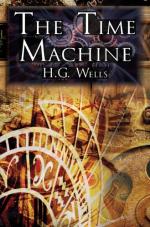|
This section contains 6,335 words (approx. 22 pages at 300 words per page) |

|
SOURCE: Cody, David C. “Faulkner, Wells, and the ‘End of Man’.” Journal of Modern Literature 18, no. 4 (fall 1993): 465-74.
In the following essay, Cody judges the influence of The Time Machine on William Faulkner's 1950 Nobel Prize speech.
We finish thus; and all our wretched race Shall finish with its cycle, and give place To other beings, with their own time-doom; Infinite eons ere our kind began; Infinite eons after the last man Has joined the mammoth in earth's tomb and womb.
—James Thomson, “The City of Dreadful Night” (1874)
Why should we bear with an hour of torture, a moment of pain, If every man die for ever, if all his griefs are in vain, And the homeless planet at length will be wheel'd thro' the silence of space, Motherless evermore of an ever-vanishing race, When the worm shall have writhed its last, and its last brother-worm will have fled...
|
This section contains 6,335 words (approx. 22 pages at 300 words per page) |

|


